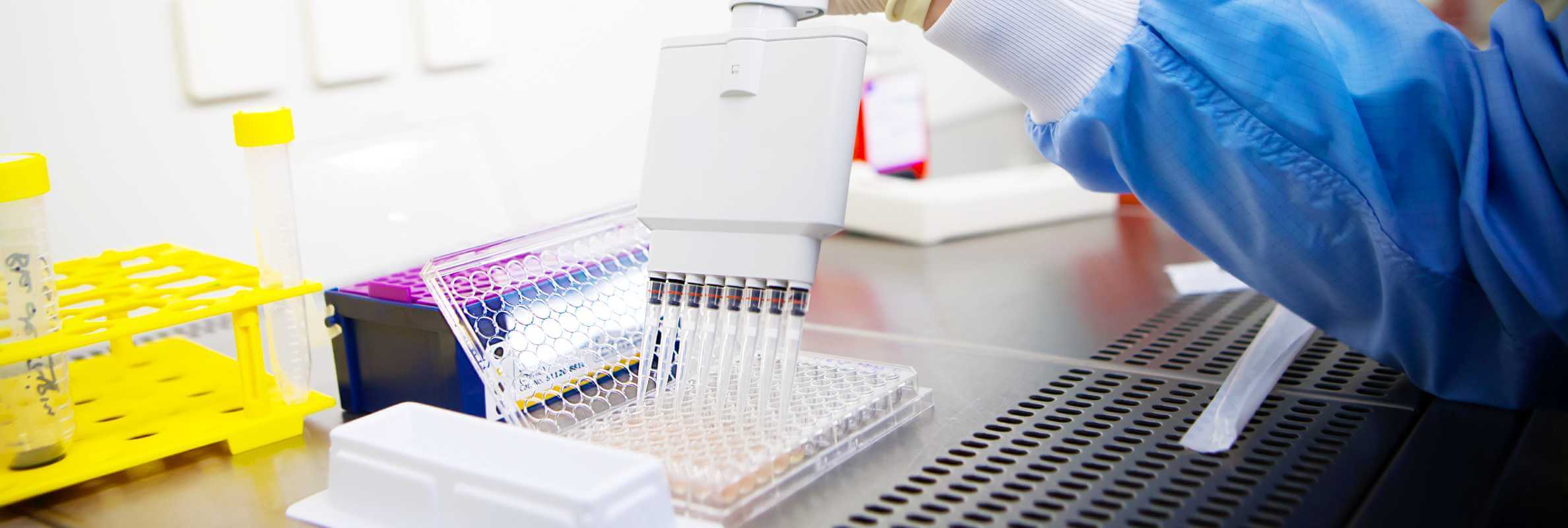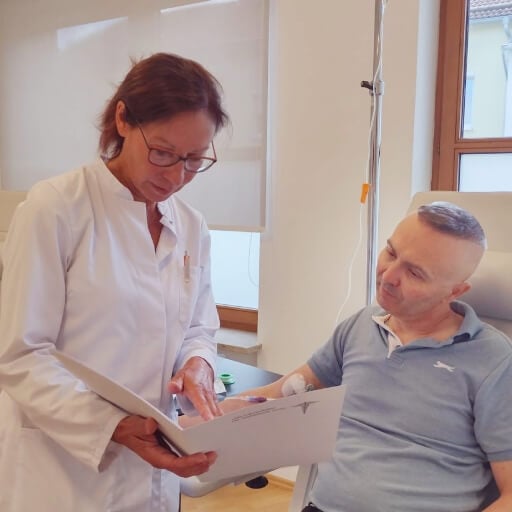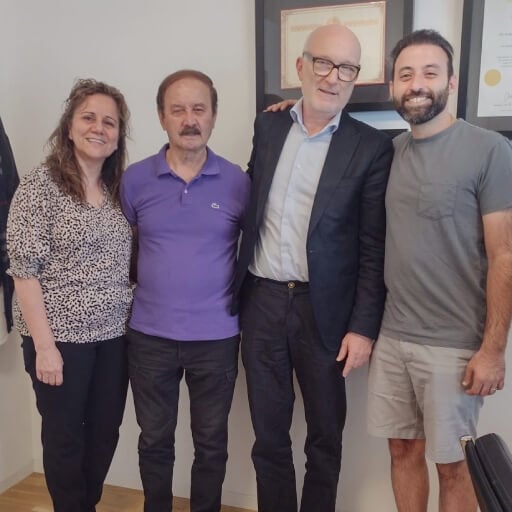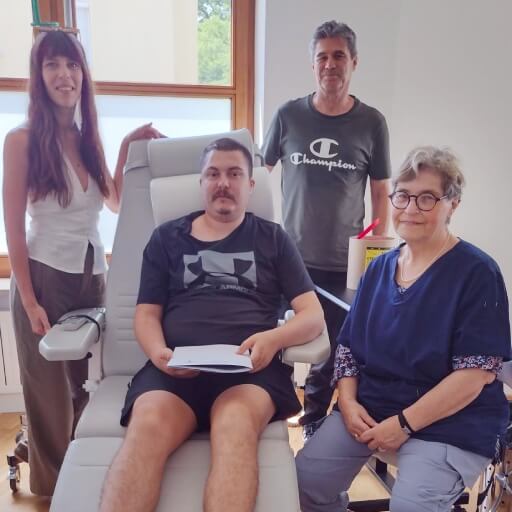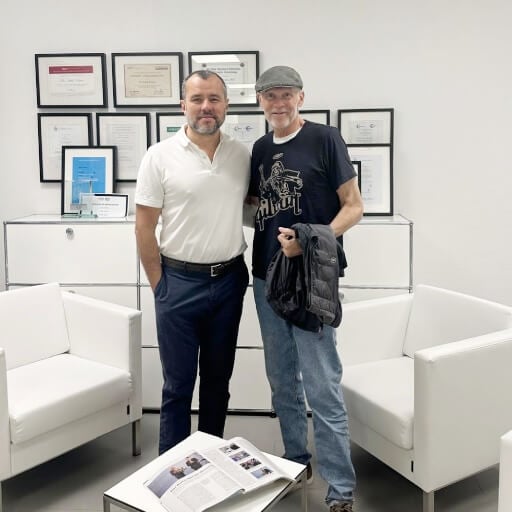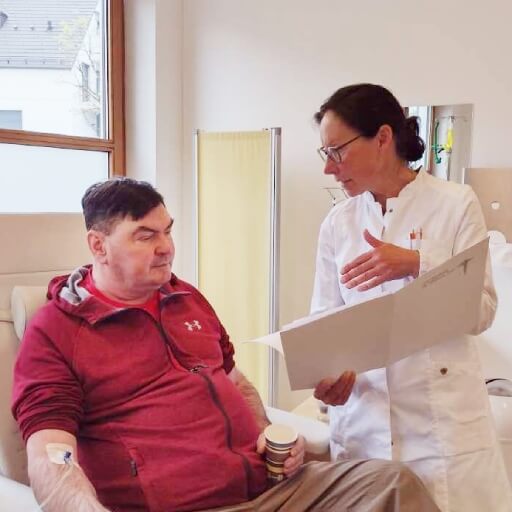Dendritic cell prostate cancer treatment represents a groundbreaking immunotherapy approach, recognized by the 2011 Nobel Prize in Physiology or Medicine, awarded to Ralph Steinman [1]. This innovative method can be prescribed to men of all ages and at any stage of prostate cancer, serving as an effective addition to standard treatment protocols. The therapy requires just a single injection to create lasting anticancer immunity. German hospitals produce dendritic cell based vaccines individually using the patient's own biological material, enabling the immune system to recognize and fight cancer cells independently after administration, without requiring additional injections for sustained therapeutic effect.
Who may need dendritic cell vaccination in prostate cancer?
Dendritic cell vaccination offers hope for a broad spectrum of prostate cancer patients, from those in early stages seeking to prevent progression to patients with metastatic disease who need advanced immune support. This innovative therapy is particularly valuable for patients with metastatic prostate cancer who have exhausted conventional treatments, as well as those at various stages of the disease journey.
Early-Stage Prostate Cancer: Prevention and Risk Reduction
Dendritic cell therapy shows particular promise for men with early-stage prostate cancer, where it can significantly reduce the risk of disease progression. When administered in the initial phases of treatment, the dendritic cell based vaccine helps establish strong immune responses against tumor cells, potentially preventing the future spread of the disease.
Key benefits for early-stage patients treated with the DC vaccine:
- Reduces recurrence risk without the harsh side effects of chemotherapy or radiation
- Creates lasting immune memory that continues protecting against cancer cells long after treatment
- Integrates seamlessly with existing treatment plans while enhancing overall outcomes
This proactive immunotherapy approach is especially valuable for patients who want to take control of their health early in their cancer journey, offering both immediate protection and long-term peace of mind with no tumor cells spreading.
Post-Surgery PSA Rising: Preventing Prostate Cancer Recurrence
Another crucial group of candidates for this therapy is patients with post-surgery PSA elevation. For these men, rising PSA levels despite the absence of visible metastases on CT/MRI scans can signal residual tumor cells and heightened recurrence risk. Dendritic cell vaccination at this stage has proven particularly effective in preventing disease progression and maintaining long-term remission due to suppressing tumor cells throughout the body.
The efficacy of this approach was demonstrated in the "PROTECT Treatment and Early Cancer Treatment " clinical study, completed in 2015, which involved several hundred operated men with early-stage and recurrent prostate cancer. With participants ranging from 18 to 80 years, the study showed remarkable results. During the trial, participants received a single injection of the prostate cancer vaccine. As a result, the majority of patients treated experienced a decrease in their PSA levels to normal levels and went into remission. [2]
Advanced Prostate Cancer: Extending Life When Other Treatments Fail
The second group of candidates for DCT for cancer treatment is patients with metastatic prostate tumors and hormone-resistant tumor cells who have also undergone prostate removal surgery. [3] At stage 3 and stage 4 of cancer, dendritic cell based vaccines help the immune system cope with metastases of all locations and sizes. Although dendritic cell based immunotherapy cannot completely cure cancer, it significantly prolongs a person's life and reduces symptoms.
"In clinics in Germany, dendritic cell vaccination can be carried out at any stage of cancer and in men of all ages. It provides high success rates even when chemotherapy, radiation therapy, and hormone treatments fail to control the disease progression."
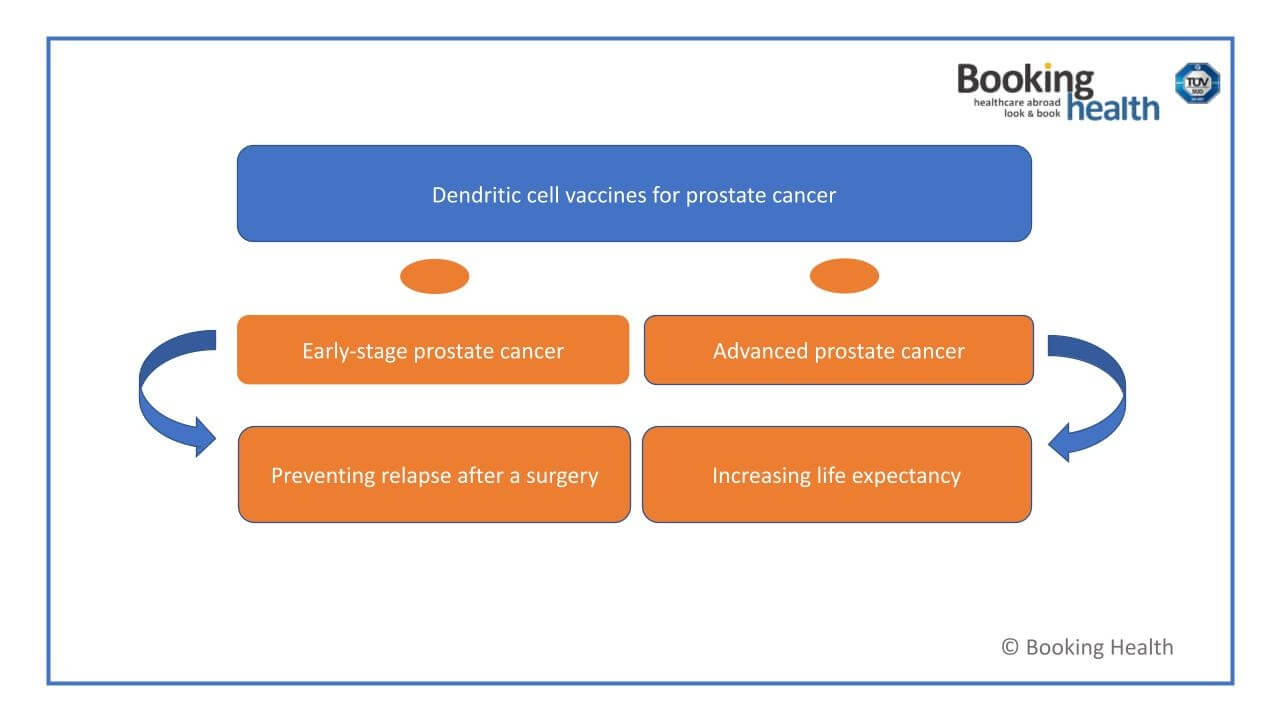
How Does Dendritic Cell Therapy for Prostate Cancer Work?
Dendritic cell therapy represents a sophisticated immunotherapy approach that harnesses the body's natural defense mechanisms to target prostate cancer cells with remarkable precision. This personalized treatment process is particularly beneficial for patients with metastatic disease, as it trains the immune system to recognize and attack cancer cells throughout the body, while also offering hope to patients with metastatic prostate cancer who have not responded to conventional therapies.
Step-by-Step Process of Dendritic Cell Therapy for Prostate Cancer
Dendritic cell therapy follows a precise, carefully structured treatment program to reliably destroy all the tumor cells. It consists of several key stages:
- Initial Consultation and Examination (Day 1). The process begins with a comprehensive evaluation where doctors review your medical history and perform a thorough clinical examination. During this visit, you'll undergo essential laboratory testing, including complete blood count and liver/kidney function assessments. The medical team will also collect the biological material needed for your personalized dendritic cell based vaccine, typically through blood sampling or, when available, tumor cell samples.
- Cancer Vaccine Development Period (7 Days). Following your initial visit, laboratory specialists begin the sophisticated process of preparing your personalized dendritic cell vaccine. During this week-long period, they carefully process your cells, transforming them into specialized dendritic cells that can effectively target prostate cancer foci.
- Vaccination Day (Day 8). Once your personalized cancer vaccine is ready, you'll return to the clinic for the dendritic cell based immunotherapy administration. This outpatient procedure includes the vaccination itself along with any necessary supportive treatments. The medical team provides comprehensive care during this visit, including symptomatic management if needed and access to specialist consultations when indicated. A single injection is enough to see the desired therapeutic result.
Throughout the entire process, you'll be under the care of experienced medical professionals who monitor your progress and ensure optimal treatment outcomes. The outpatient nature of the therapy allows you to maintain your normal daily activities between treatment steps, making it a convenient option for many patients.
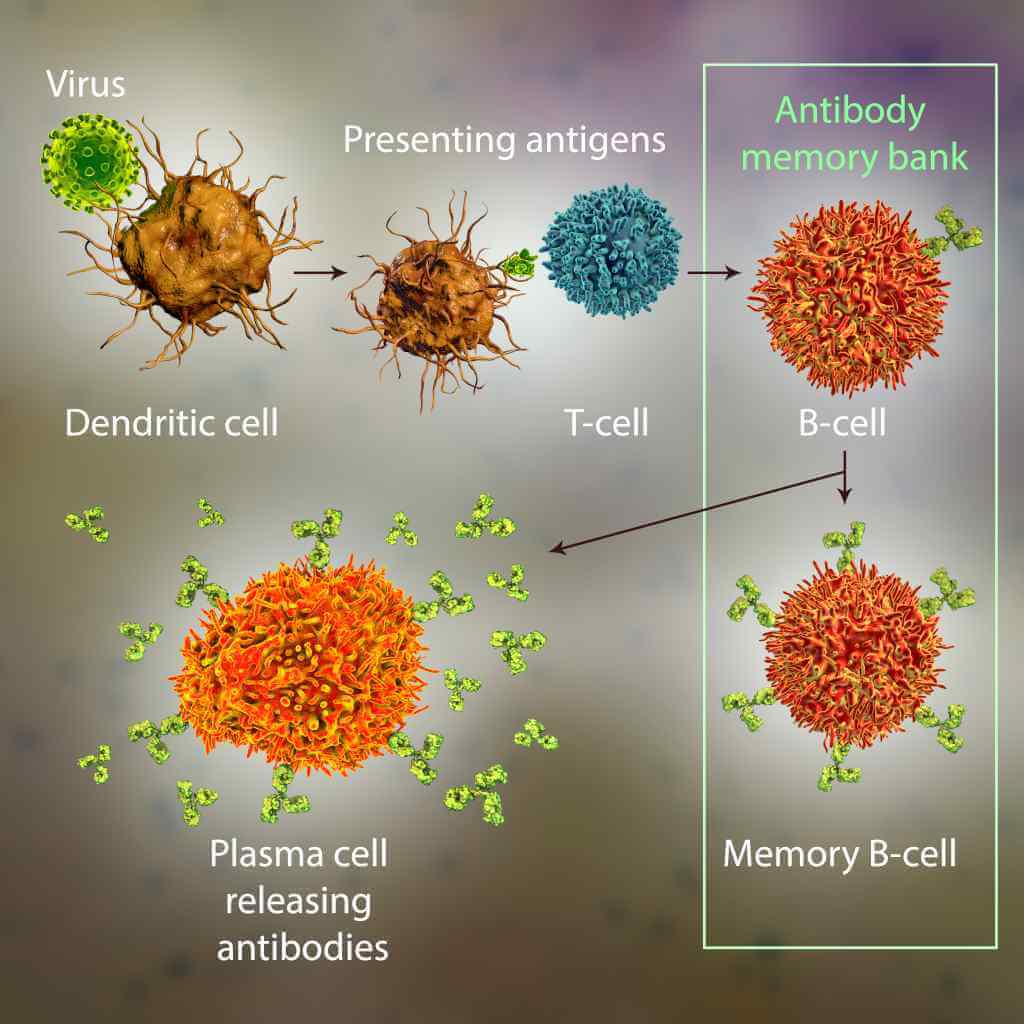
Personalized Treatment Plans for Prostate Cancer
One of the key advantages of dendritic cell therapy is its remarkable flexibility when combined with other treatment approaches [4]. The vaccine can be effectively integrated into various treatment protocols at any stage of the disease progression, working in harmony with other therapeutic methods to enhance overall treatment outcomes.
For patients with metastatic disease undergoing active treatment, dendritic cell vaccination can be combined with surgery, radiation therapy, or systemic treatments. The timing of vaccination can be carefully planned to maximize its effectiveness while minimizing any potential interference with other ongoing treatments. [5]
This personalized approach ensures that each patient receives the most appropriate and effective combination of treatments for their specific case. Below, we compare various treatments available for early and advanced prostate cancer patients, including their effectiveness, duration, and associated costs. This comparison helps illustrate why dendritic cell therapy has become an increasingly popular choice among patients and healthcare providers.
| Toxicity | Therapy Duration | Early Stage Effectiveness (5-year survival rate) | Duration of treatment effect | Treatment Cost | |
|---|---|---|---|---|---|
| Chemotherapy | High (65-80%) | Depending on the cancer stage, up to lifelong | Up to 75%, with significant side effects | Short-term effect, limited to the course of treatment | €80,000 - €150,000 for the full course |
| Hormone therapy | Low (10-15%) | Given for several months, usually followed by chemotherapy | Up to 70% for hormone-sensitive cases only | The effect is present only during treatment | €10,000 - €15,000 |
| Dendritic cell vaccine strategies | Very low (about 1%) | Single injection and lifelong immunity | Up to 95% with minimal impact on quality of life | Reliable long-term result, long-lasting remission | €20,000 - €38,000 |
| Targeted therapy | Low (15-20%) | Depending on the cancer stage, treatment may take about a year | Up to 75% for matching mutations only | The effect is quite long-lasting in the presence of specific mutations in the tumor cells | €375,000 - €420,000 for the full course |
*Booking Health data. Success rates vary depending on cancer type, stage, and individual factors of the patient treated.
Why is Dendritic Cell Therapy Effective for Prostate Cancer?
The main task of immunotherapy is to prolong a patient's life and reliably control the disease when other treatment methods are no longer able to do this (for example, tumor cells have become insensitive to hormone therapy and chemotherapy drugs) [6]. Autologous dendritic cell vaccines are part of a comprehensive treatment protocol and can be used in parallel with prostatectomy, radiation therapy, and systemic drug administration.
In the early stages of prostate cancer, after radical prostatectomy as the only treatment, vaccination reduces the risk of recurrence. The components of the vaccine teach the male immune system to find and destroy malignant tumor cells remaining in the body (for example, micrometastases), preventing them from developing into a full-fledged tumor.
"The treatment results in long-term immunological memory. In the future, the immune system will continue to fight the tumor cells on its own."
In advanced prostate cancer, vaccination has become a way to control the disease better and prolong life. After completing a full course of vaccination, life expectancy increases by several months, even in stage 4 cancer. Given the good tolerability of dendritic cell therapy for stage 4 cancer, these preparations were initially intended specifically for men with advanced prostate cancer, in whom other therapeutic methods had already exhausted themselves.
Leading dendritic cell based immunotherapy specialist Professor Frank Gansauge brings over two decades of expertise in dendritic cell treatment to our discussion. His pioneering work has significantly advanced cancer therapy, particularly in treating prostate cancer. Here, Prof. Gansauge discusses the remarkable potential and proven results of this innovative treatment approach.
Leading Immunotherapy Expert Prof. Frank Gansauge: "Revolutionizing Prostate Cancer Treatment with Dendritic Cell Therapy"
Why is Germany a Leading Destination for Prostate Cancer Treatment?
Germany stands at the forefront of innovative cancer treatments, combining traditional therapeutic approaches with groundbreaking immunotherapy methods [7]. The country's healthcare system is particularly renowned for its advanced dendritic cell therapy programs, offering hope to prostate cancer patients from around the world.
Advanced Treatment Facilities That Offer DC Vaccines for Prostate Cancer
- LDG - Laboratories Dr. Gansauge (Berg). Under the leadership of Prof. Frank Gansauge, this facility has established itself as a pioneer in dendritic cell therapy with over 22 years of experience. The laboratory has developed sophisticated protocols for vaccine production and achieved remarkable success rates in prostate cancer treatment, making it a preferred choice for patients worldwide.
- Praxisgemeinschaft für Zelltherapie (Duderstadt). This facility is recognized for its personalized approach to cancer immunotherapy and comprehensive treatment programs, offering individualized dendritic cell vaccines for prostate cancer patients.
- IOZK Immuno-Oncology Center (Cologne). Specializing in integrated immunotherapy approaches, IOZK combines dendritic cell therapy with other innovative treatment methods to achieve optimal outcomes for prostate cancer patients.
Accessing Dendritic Cell Vaccine Treatment for Prostate Cancer in Germany
For international patients seeking dendritic cell therapy in Germany, Booking Health serves as a reliable medical tourism provider that simplifies the entire treatment process. The comprehensive service package includes:
- Expert selection of appropriate hospitals and specialized physicians
- Direct appointment scheduling without typical waiting periods
- Complete treatment program planning, including all necessary procedures
- Cost optimization with potential savings up to 50% on treatment fees
- Ongoing support with translation services and medical coordination
- Organization of all travel logistics, including accommodation and transfers
- Post-treatment communication with German hospitals and follow-up care arrangements
Working with Booking Health ensures a smooth treatment journey, allowing patients to focus entirely on their recovery while experienced coordinators handle all organizational aspects. Cancer patients can begin their treatment journey by submitting a request through Booking Health's website, where medical advisors will provide detailed consultation and treatment planning.
Innovation in Cancer Care: Dendritic Cell Stories with Booking Health
Frequently Asked Questions About Dendritic Cell Therapy for Prostate Cancer
Send request for treatmentDendritic cell therapy for prostate cancer involves extracting dendritic cells from the patient, modifying them to target prostate cancer cells, and reintroducing them into the body. This process stimulates the immune system to recognize and attack the cancer cells, potentially improving treatment outcomes.
Benefits include a targeted immune response, reduced side effects compared to traditional treatments, and the potential for long-term remission. This therapy can be particularly beneficial for patients with metastatic prostate cancer.
Effectiveness is monitored through regular prostate-specific antigen (PSA) tests, imaging studies, and clinical evaluations. These assessments help doctors determine the therapy's impact and make any necessary adjustments.
Yes, dendritic cell therapy can be used alongside traditional treatments such as surgery, radiation therapy, and hormone therapy. Combining therapies can enhance overall treatment effectiveness and improve patient outcomes.
Most side effects are mild, including fever and fatigue. Severe side effects are rare but can occur, necessitating close monitoring during treatment to manage any adverse reactions promptly.
Dendritic cell therapy is a personalized immunotherapy that uses your dendritic cells to create a prostate cancer vaccine. These specialized cells are modified to recognize cancer and train your immune system to fight prostate cancer cells throughout your body.
Yes, in Germany prostate cancer treatment centers offer advanced dendritic cell therapy. Leading German clinics like LDG Laboratories provide this innovative treatment with over 20 years of experience in cancer immunotherapy.
Dendritic cell therapy works as a complementary targeted treatment rather than a complete replacement. Unlike chemotherapy, it enhances your immune response with minimal side effects, but comparison with chemotherapy shows it's best used alongside traditional treatments.
The therapy involves antigen presentation where your dendritic cells are trained to recognize prostate cancer markers. After reinjection, these cells provide immune stimulation that helps your body naturally identify and destroy cancer cells.
Clinical studies show significant effectiveness with up to 95% success rates in early-stage cases. The cancer immunotherapy results demonstrate long-term cancer control, with many cancer patients achieving lasting remission after a single treatment cycle.
German hospitals accept prostate cancer patients of any age. Whether you have early-stage disease, rising PSA levels, or metastatic prostate cancer, specialized centers evaluate each case individually for treatment suitability.
Unlike chemotherapy or radiation, this cancer immunotherapy success approach uses your body's natural defenses with minimal toxicity. It creates lasting immune memory, providing continued protection long after the single injection treatment.
The dendritic cell vaccine price ranges between €20,000 and €38,000. This cancer treatment cost is significantly lower than targeted therapy options while offering superior long-term outcomes and quality of life.
Success rates vary by stage, with early-stage prostate cancer patients showing up to 95% positive outcomes. Even in advanced prostate cancer, the therapy significantly extends life expectancy while maintaining excellent quality of life compared to traditional treatments.
Five-year survival after standard treatment is 65–70%, while dendritic cell therapy increases this figure to 80%. This is due to the activation of the patient’s own immunity which continues to destroy tumor cells even after treatment is completed.
Traditional methods often require radical intervention. Dendritic cell immunotherapy allows preserving organ function in more than 85% of cases while standard treatment gives about 60%. This provides a better quality of life after therapy without serious complications.
Yes, the risk of tumor recurrence is more than halved: from approximately 30% to 12–15%. This is because the immune system “remembers” cancer cells and continues to recognize and destroy them even after the main course of treatment is completed.
Yes, the method demonstrates high efficiency even in cases where chemotherapy does not work. Dendritic cells activate cytotoxic T-lymphocytes, which attack resistant tumor cells improving control over tumor growth and reducing the risk of its further progression.
Yes, it is effective even in inoperable or advanced forms of the disease, when traditional methods are limited. Immunotherapy activates the body’s natural defense mechanisms, slows down tumor progression and helps stabilize the patient’s condition for a long time.
Yes, it reduces the risk of metastasis by activating specific immune defenses. Dendritic cells teach the body to recognize and destroy even single tumor cells, preventing the spread of cancer and the development of secondary foci in distant organs.
A course of dendritic cell therapy costs €20,000–38,000 which is significantly less than targeted therapy (up to €420,000). Chemotherapy costs approximately €80,000–150,000, but has high toxic risks. Immunotherapy provides better effectiveness and long-term results.
In Germany prostate cancer patients receive dendritic cell therapy only after thorough evaluation. Treatments are tailored individually and performed under close monitoring. Treatment is also integrated with standard oncology care to enhance immune response.
Choose treatment abroad and you will for sure get the best results!
Authors:
The article was edited by medical experts, board certified doctors Dr. Nadezhda Ivanisova and Dr. Bohdan Mykhalniuk. For the treatment of the conditions referred to in the article, you must consult a doctor; the information in the article is not intended for self-medication!
Our editorial policy, which details our commitment to accuracy and transparency, is available here. Click this link to review our policies.
Sources:
[1] PubMed. The 2011 Nobel Prize in physiology or medicine. https://pubmed.ncbi.nlm.nih.gov/22053831/
[2] NIH, National Library of Medicine. PROTECT – Treatment and Early Cancer Treatment. https://www.clinicaltrials.gov/study/NCT00779402
[3] NIH, National Library of Medicine. Natural Dendritic Cells for Immunotherapy of Chemo-naive Metastatic Castration-resistant Prostate Cancer Patients. https://clinicaltrials.gov/study/NCT02692976
[4] PubMed. Prostate cancer vaccines in combination with additional treatment modalities. https://pubmed.ncbi.nlm.nih.gov/24838261/
[5] PLOS. Dendritic Cell Based Tumor Vaccination in Prostate and Renal Cell Cancer: A Systematic Review and Meta-Analysis. https://journals.plos.org/plosone/article?id=10.1371/journal.pone.0018801
[6] PubMed Central. Dendritic Cell-Based Immunotherapy for Prostate Cancer. https://pmc.ncbi.nlm.nih.gov/articles/PMC2975068/
[7] PubMed Central. The Treatment of Localized Prostate Cancer in Everyday Practice in Germany. https://pmc.ncbi.nlm.nih.gov/articles/PMC4904528/
Read:
Dendritic cell therapy in cancer treatment in Germany - Vaccination against cancer
Immunotherapy for prostate cancer in Germany
NanoKnife® prostate cancer treatment
VTP TOOKAD®: prostate cancer treatment with a minimal risk of complications
Article menu:
- Who may need dendritic cell vaccination in prostate cancer?
- How Does Dendritic Cell Therapy for Prostate Cancer Work?
- Why is Dendritic Cell Therapy Effective for Prostate Cancer?
- Why is Germany a Leading Destination for Prostate Cancer Treatment?
- Frequently Asked Questions About Dendritic Cell Therapy for Prostate Cancer
Don't know where to start?
Contact Booking Health